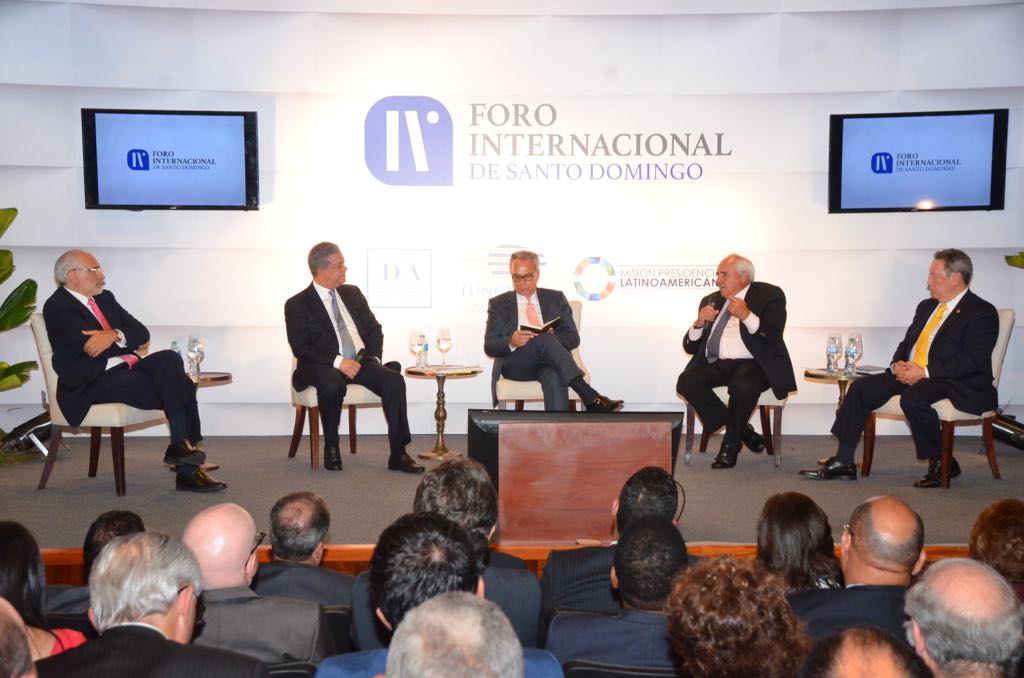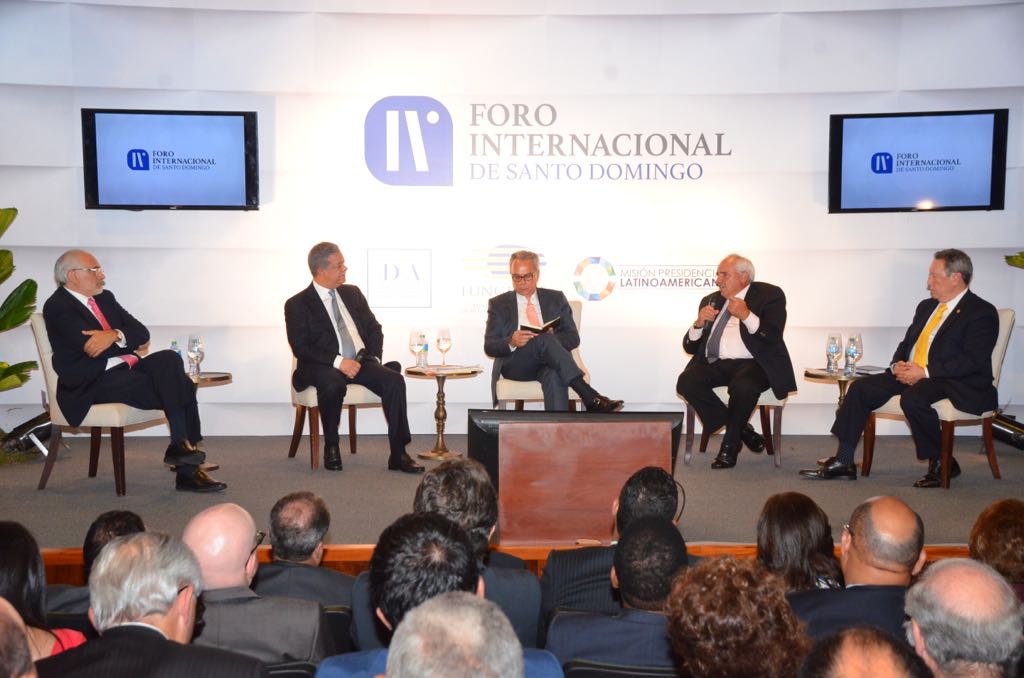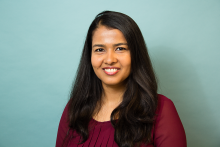IDEA Internacional junto con FUNGLODE organizó el IV Foro Internacional de Santo Domingo
SANTO DOMINGO, REPÚBLICA DOMINICANA
SANTO DOMINGO, REPÚBLICA DOMINICANA
PUBLISHED:
30/01/2018

De izquierda a derecha Carlos Mesa, expresidente de Bolivia; Leonel Fernández, expresidente de República Dominicana; Dr. Daniel Zovatto, Director Regional de IDEA Internacional; Ernesto Samper, expresidente de Colombia; Vinicio Cerezo, expresidente de Guatemala (Crédito foto: Apolinar Moreno/FUNGLODE)
El IV Foro Internacional de Santo Domingo bajo el tema “El estado de la democracia en América Latina: 40 años desde la tercera ola de la democracia”, organizado por IDEA Internacional, junto la Fundación Global Democracia y Desarrollo (Funglode), se llevó a cabo del 16 al 18 de enero de 2018 en la capital dominicana.
This article is available in English.
El Foro Internacional de Santo Domingo es una iniciativa de diálogo e intercambio permanente establecido desde el año 2009, en donde asisten expresidentes, políticos, intelectuales, periodistas, funcionarios de organismos internacionales, y representantes de la sociedad civil, de América Latina, Europa y Estados Unidos. En esta oportunidad, reflexionaron acerca del estado de salud de las democracias latinoamericanas y sus instituciones, a fin de propiciar una reflexión sobre las prioridades y los desafíos de la agenda político-institucional y socioeconómica para la región en los próximos años. El encuentro se desarrolló a las puertas de un maratón electoral en América Latina, con seis elecciones presidenciales en 2018, que forman parte del super-ciclo electoral latinoamericano (14 elecciones presidenciales entre noviembre de 2017 y fines de 2019, dos de las cuales ya tuvieron lugar: Chile y Honduras). Las seis elecciones presidenciales de este año serán: Costa Rica, en febrero; Paraguay, en abril; Colombia, en mayo; México, en julio; Brasil, en octubre, y, eventualmente, si se llega a un acuerdo, en Venezuela.
Como parte del programa inaugural, el Ingeniero Sergio Bitar, Miembro del Consejo de Asesores de IDEA Internacional, presentó la publicación “El estado de la democracia en el mundo 2017: Examen de a resiliencia democrática”, el cual aborda la resiliencia democrática a nivel mundial. La primera edición explora la capacidad de recuperación de la democracia desde 1975, explorando los desafíos y riesgos para la democracia y las condiciones propicias para su resiliencia. La resiliencia, para esta publicación, se define como una propiedad de los sistemas sociales para hacer frente, sobrevivir y recuperarse de los complejos desafíos y crisis que presentan estrés o presión que pueden conducir a una falla sistémica. La capacidad del sistema para ser flexible, recuperarse, adaptarse e innovar frente a los desafíos inminentes apunta a su capacidad de recuperación.
La presentación de la publicación por el Ingeniero Bitar sirvió de base para la discusión durante el panel inaugural con cuatro expresidentes de América Latina. El panel, denominado el “Estado de democracia a nivel global y en América Latina” contó con la moderación del Dr. Daniel Zovatto, Director Regional para América Latina y el Caribe del IDEA Internacional, quien a través de una exposición sobre el contexto político-social del estado de la democracia a nivel global y regional, propició el debate y reflexión entre los expresidentes de Colombia; Ernesto Samper (1994-1998); Carlos Mesa, expresidente de Bolivia (2003-2005); Vinicio Cerezo, de Guatemala (1986-1991), y el anfitrión del evento, el expresidente Leonel Fernández (1996-2000/2004-2012). Asimismo, en la jornada inaugural del foro estuvo presente Margarita Cedeño de Fernández, Vicepresidenta de República Dominicana entre otras importantes personalidades asistentes.
El miércoles 17 de enero, la primera sesión se enfocó en el “Análisis del contexto político democrático en América Latina”, presidida por Leonel Fernández, con la participación de Esperanza Martínez, senadora de Paraguay; Tony Raful, diputado y presidente del Parlamento Centroamericano; Ignacio Walker, senador de la República de Chile, y Lourdes Flores, expresidenta del Partido Popular Cristiano (PPC), de Perú. La segunda sesión desarrolló el tema: “Análisis de la maratón electoral 2018 en América Latina desde la perspectiva de la integridad electoral”. Tuvo como expositores a Luis Vicente León, presidente de Datanálisis; Josette Altmann, secretaria general de la Facultad Latinoamericana de Ciencias Sociales (FLACSO); Adriana Mejía Hernández, directora ejecutiva del Instituto de Ciencia Política Hernán Echavarría Olózaga; José Woldenberg, expresidente del Instituto de Estudios de la Transición Democrática; Torquato Jardim, ministro de Justicia y Seguridad Pública, de Brasil, y Guzmán Ibarra, presidente de la Asociación de Ciencia Política del Paraguay. La mesa estuvo dirigida por Daniel Zovatto. El “Análisis del contexto socioeconómico en América Latina”, centró la tercera sesión, moderada por Ernesto Samper, con las intervenciones de Hugo Beteta, director de la sede subregional de la Comisión Económica para América Latina y el Caribe (CEPAL), en México; José Manuel Salazar-Xirinachs, director regional para América Latina y el Caribe de la Organización Internacional del Trabajo (OIT); Margarita Cedeño de Fernández, vicepresidenta de la República Dominicana, y el analista político Carlos Alzugaray. El director ejecutivo de Funglode, Marco Herrera, encabezó la cuarta sesión, en la que analizaron la “Nueva agenda de la clase media en América Latina”. Participaron de esta, Michael Reid, editor senior de la revista The Economist; Sergio Bitar, exministro de Chile, académico y presidente de la Fundación por la Democracia, y Mónica Xavier Yelpo, política uruguaya.
La mañana del jueves 18, Vinicio Cerezo presidió la quinta sesión, con las exposiciones de Iván Velásquez, comisionado de la Comisión Internacional contra la Impunidad en Guatemala (CICIG); Juan Carlos Botero, director ejecutivo del World Justice Project; Cynthia Arnson, directora del Programa Latinoamericano del Woodrow Wilson International Center for Scholars y Josefina Reynoso Chicón, directora del Centro de Estudios de Seguridad y Defensa (CESEDE), quienes reflexionaron sobre el “Estado de derecho: inseguridad, corrupción e impunidad en América Latina”. El “Impacto de las redes sociales/ Posverdad en la democracia”, fue analizado en la sexta sesión, moderada por el expresidente Mesa, con las intervenciones de los periodistas Jorge Fontevecchia y Fernando Fuentes; Sergio Gahona, diputado de Chile, y José Luis Vargas, magistrado Electoral del Tribunal Electoral de Poder Judicial de la Federación (TEPJF) de México. Con la moderación de Sergio Bitar, la sesión final fue un importante espacio de reflexión sobre la crisis en Venezuela, en la que participaron los venezolanos, Luis Vicente León, presidente de Datanálisis; Pedro Benítez, coordinador de la Comisión de Políticas Públicas de la Mesa de la Unidad Democrática, y la historiadora María Eugenia Mosquera. https://www.idea.int/es/news-media/news/es/idea-internacional-junto-con-funglode-organiz%C3%B3-el-iv-foro-internacional-de-santo
International IDEA and FUNGLODE organize the IV International Forum of Santo Domingo
SANTO DOMINGO, DOMINICAN REPUBLIC
SANTO DOMINGO, DOMINICAN REPUBLIC
PUBLISHED:
|
|
30/01/2018

From left to right: Carlos Mesa, former president of Bolivia; Leonel Fernández, former president of the Dominican Republic; Dr. Daniel Zovatto, Regional Director of International IDEA; Ernesto Samper, former president of Colombia; Vinicio Cerezo, former president of Guatemala (Photo credit: Apolinar Moreno / FUNGLODE)
The Fourth International Forum of Santo Domingo under the theme "The state of democracy in Latin America: 40 years since the third wave of democracy", organized by the Global Foundation for Democracy and Development (Funglode for its Spanish acronym), together with International IDEA, took place from 16-18 January 2018 in Santo Domingo, the capital city of Dominican Republic.
Este artículo se encuentra disponible en Castellano.
The International Forum of Santo Domingo is a permanent dialogue and exchange initiative established in 2009, which is attended by former presidents, politicians, intellectuals, journalists, officials of international organizations, and representatives of civil society from Latin America, Europe and the United States. During the three-day event, the participants reflected on the state of Latin American democracies and their institutions, in order to foster reflection on the priorities and challenges of the political-institutional and socioeconomic agenda for the region in the coming years. The meeting was held at the onset of an electoral marathon in Latin America, with six presidential elections to be held in 2018, which are part of the Latin American electoral super-cycle (14 presidential elections between November 2017 and the end of 2019, two of which already took place: Chile and Honduras). The six presidential elections in the region will be held in Costa Rica, in February; Paraguay, in April; Colombia, in May; Mexico, in July; Brazil, in October, and, eventually, if an agreement is reached, in Venezuela.
As part of the inaugural program, Engineer Sergio Bitar, Member of the Advisory Council of International IDEA, presented the publication "The State of Democracy in the World 2017: Exploring Democracy´s Resilience". The first edition of the publication explores the resilience of democracy since 1975, focusing on the challenges and risks to democracy and the enabling conditions for its resilience. Resilience, for this publication, is defined as a property of social systems to cope, survive and recover from the complex challenges and crises that present stress or pressure that can lead to a systemic failure. The ability of the system to be flexible, to recover, to adapt and to innovate in the face of impending challenges points to its resilience.
The presentation of the publication by Engineer Bitar served as the basis for the discussion during the inaugural panel with four ex-presidents from Latin America. The panel, titled the "State of democracy globally and in Latin America," was moderated by Dr Daniel Zovatto, Regional Director for Latin America and the Caribbean of International IDEA, who through an introduction of socio-political dimension of democracy at the global and regional level, led to debate and reflection among the former presidents of Colombia, Ernesto Samper (1994-1998); Carlos Mesa, former president of Bolivia (2003-2005); Vinicio Cerezo, from Guatemala (1986-1991), and the host of the event, former President Leonel Fernández (1996-2000/2004-2012). Among several important personalities who attended the inaugural panel was Margarita Cedeño de Fernández, Vice President of the Dominican Republic.
On Wednesday, January 17, the first session focused on the "Analysis of the democratic political context in Latin America," chaired by Leonel Fernández, with the participation of Esperanza Martínez, Senator from Paraguay; Tony Raful, Deputy and President of the Central American Parliament; Ignacio Walker, Senator from the Republic of Chile; and Lourdes Flores, Former President of the Popular Christian Party (PPC) of Peru. The second session on the theme: "Analysis of the 2018 electoral marathon in Latin America from the perspective of electoral integrity", moderated by Daniel Zovatto, had as speakers Luis Vicente León, President of Datanálisis; Josette Altmann, General Secretary of the Latin American Faculty of Social Sciences (FLACSO); Adriana Mejía Hernández, Executive Director of the Institute of Political Science Hernán Echavarría Olózaga; José Woldenberg, former president of the Institute of Studies of the Democratic Transition; Torquato Jardim, Minister of Justice and Public Security of Brazil, and Guzmán Ibarra, President of the Political Science Association of Paraguay. The third session "Analysis of socioeconomic context in Latin America", was moderated by Ernesto Samper, with the interventions of Hugo Beteta, Director of the Sub-regional headquarters of the Economic Commission for Latin America and the Caribbean (ECLAC), in Mexico; José Manuel Salazar-Xirinachs, Regional Director for Latin America and the Caribbean of the International Labor Organization (ILO); Margarita Cedeño de Fernández, Vice President of the Dominican Republic, and political analyst Carlos Alzugaray. The Executive Director of Funglode, Marco Herrera, led the fourth session on "New agenda of the middle class in Latin America". The speakers for this session were Michael Reid, senior editor of The Economist magazine; Sergio Bitar, former Minister of Chile, academic and president of the Foundation for Democracy, and Mónica Xavier Yelpo, Uruguayan politician.
On the morning of Thursday the 18th, Vinicio Cerezo presided over the fifth session, with presentations from Iván Velásquez, Commissioner of the International Commission against Impunity in Guatemala (CICIG); Juan Carlos Botero, Executive Director of the World Justice Project; Cynthia Arnson, Director of the Latin American Program of the Woodrow Wilson International Center for Scholars and Josefina Reynoso Chicón, Director of the Center for Security and Defense Studies (CESEDE), who reflected on the "Rule of Law: insecurity, corruption and impunity in Latin America" . The "Impact of social networks / post-trust in democracy" was analyzed in the sixth session, moderated by former President Mesa, with the interventions of journalists Jorge Fontevecchia and Fernando Fuentes; Sergio Gahona, Deputy of the Congresss of Chile, and José Luis Vargas, Electoral Judge of the Electoral Tribunal of the Federal Judicial Branch (TEPJF for its Spanish acronym) of Mexico. With the moderation of Sergio Bitar, the final session was an important space for reflection on the crisis in Venezuela, with presentations from three Venezuelans, Luis Vicente León, President of Datanalisis; Pedro Benítez, Coordinator of the Public Policy Commission of the Democratic Unity Table, and historian María Eugenia Mosquera. https://www.idea.int/news-media/news/international-idea-and-funglode-organize-iv-international-forum-santo-domingo

No hay comentarios.:
Publicar un comentario